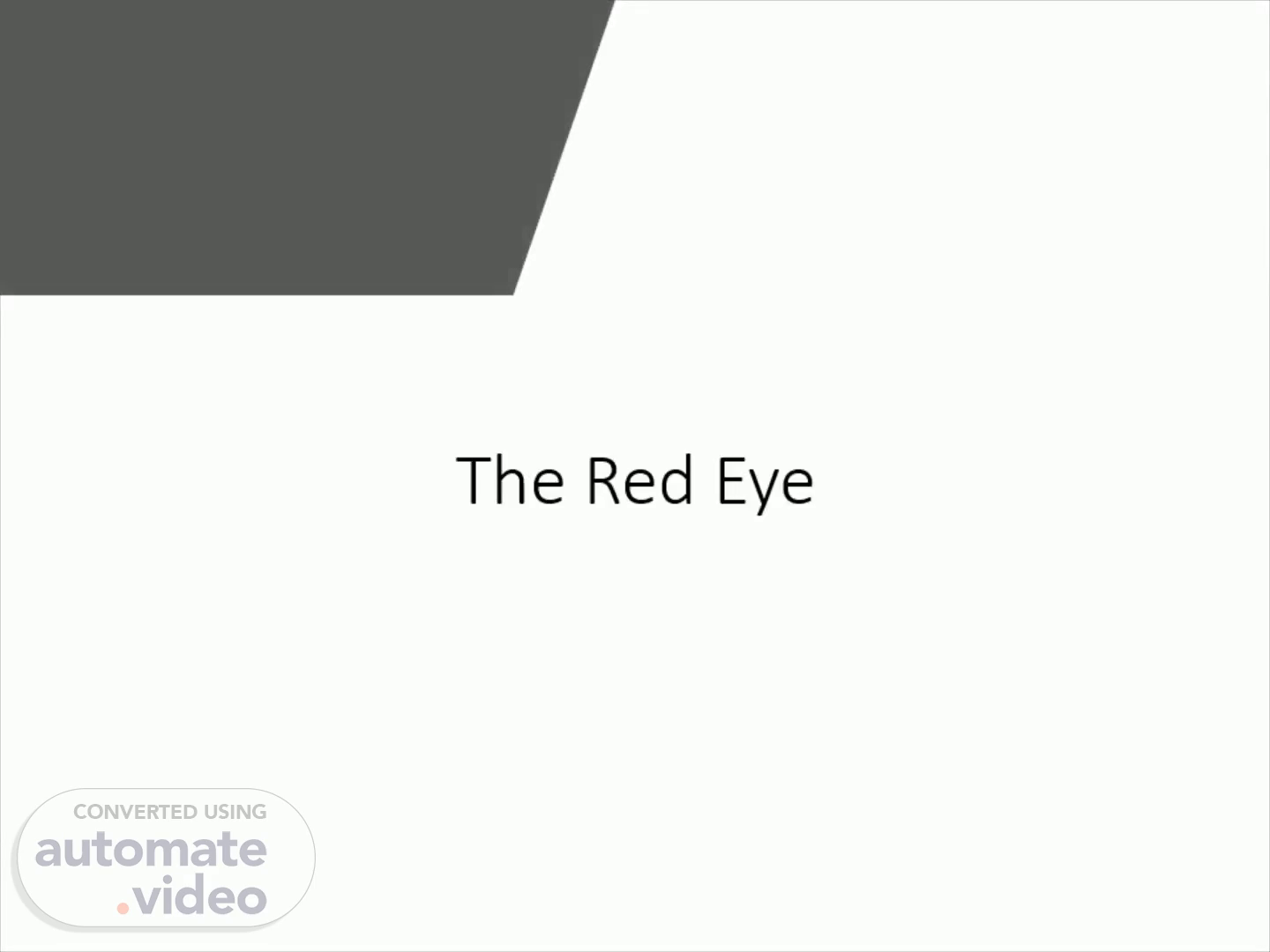Page 1 (0s)
The Red E ye. Dr Sarah Powell. UCD DUBLIN.
Page 2 (20s)
Learning Outcomes. Common causes of red eye Ophthalmic history taking How each condition presents How to manage each condition Red flags.
Page 3 (54s)
History. Pain? Vision loss? Unilateral/Bilateral? Trauma? Discharge? Photophobia? Hx previous/other eye problems NB Surgery? Contact lens use? Medical history?.
Page 4 (2m 34s)
Red eye. Painless. Painful. Subconjunctival haemorrhage ? Episcleritis.
Page 5 (2m 47s)
Anatomy. Eye Anatomy conjunctiva iris lens pupil cornea conjunctiva sclera ciliary body vitreous body anterior chamber choroid retina macula optic nerve optic disc.
Page 6 (5m 2s)
Trauma. Corneal abrasion Treatment?.
Page 7 (6m 26s)
Trauma. Corneal foreign body Subtarsal foreign body.
Page 8 (7m 32s)
Viral. Bacterial. Allergic. Conjunctivitis – the culprits.
Page 9 (8m 2s)
Conjunctival injection. Discharge. Conjunctival papillae.
Page 10 (8m 33s)
Viral Conjunctivitis. Recent URTI Highly contagious & self limiting Signs: Conjunctival follicles Preauricular lymph nodes Watery discharge Treatment: Frequent hand washing Lubricants Cool compresses.
Page 11 (9m 40s)
Bacterial Conjunctivitis. Purulent discharge Most common organisms: Staph, Strep, Haemophilus Treatment: topical Chloramphenicol QDS x 1/52 Not improving? – take a swab ? Chlamydia, ? Gonococcal.
Page 12 (10m 51s)
Allergic Conjunctivitis. Itching, watery discharge, atopy Bilateral Topical antihistamines Oral antihistamines Ocular lubricants/cool compresses Consider vernal conjunctivitis Young boys, hot dry climates Cobblestone papillae on lids Can get corneal ulceration “shield ulcer”.
Page 13 (12m 15s)
Subconjunctival Haemorrhage. Asymptomatic Etiology : - Valsalva (coughing), traumatic, hypertension, idiopathic No treatment required.
Page 14 (13m 4s)
Dry Eye. Dryness, foreign body sensation, burning – worsens over day. Red eye, can get associated blepharitis. Punctate corneal erosions Tx: preservative free artificial tears, eyelid therapy..
Page 15 (14m 36s)
Keratitis. Inflammation of the cornea. Infective.
Page 16 (14m 59s)
Viral keratitis. Herpes Simplex Virus type 1 Symptoms – sore red eye, some blurring, some photophobia Signs – dendritic ulcer Tx – topical Acyclovir AVOID STEROIDS!.
Page 17 (16m 1s)
Geographic ulcer. Don’t treat a dendritic ulcer with steroids!.
Page 18 (16m 23s)
Herpes zoster - ophthalmic shingles. Prodromal illness Unilateral painful vesicles – in distribution of ophthalmic branch of Trigeminal nerve VZV May have ocular involvement Hutchinson’s sign suggests ocular involvement Tx – PO Acyclovir.
Page 19 (17m 27s)
Herpes zoster – ocular complications. Lid scarring Conjunctivitis Keratitis Uveitis Scleritis Necrotising retinitis.
Page 20 (17m 57s)
Bacterial keratitis. Risk factors? Contact lens wear Trauma Symptoms? Painful red eye Foreign body sensation Reduced vision Photophobia Signs? Red eye Corneal infiltrate Epithelial defect Anterior chamber cells Hypopyon.
Page 21 (19m 5s)
abstract. abstract. Bacterial keratitis - management.
Page 22 (20m 9s)
Fungal keratitis.
Page 23 (20m 41s)
Acanthamoeba keratitis. Initially – pain out of proportion to clinical findings Later – ring infiltrate Can come from tap water – never swim or shower with CL, never rinse CL with tap water.
Page 24 (21m 53s)
Uveitis. Retina Fovea (center of the macula) Area of the Optic Disk Optic Nerve Cntral Retinal Vitreous Chamber Conjunctiva Cornea Pupil Iris Cilia Bod.
Page 25 (22m 32s)
Acute anterior uveitis. Symptoms Painful red eye Photophobia Blurred vision Signs Circumciliary injection Anterior chamber cells and flare Keratic precipitates Hypopyon Posterior synechiae.
Page 26 (24m 19s)
Anterior Uveitis. Posterior synechiae. DJO Digital Journal of Ophthalmology www.djo.harvard.edu.
Page 27 (25m 38s)
Anterior chamber cells & flare. Keratic precipitates.
Page 28 (26m 12s)
Uveitis - Investigations. Anterior uveitis often idiopathic in young people May have systemic associations HLA B27 phenotype Ankylosing spondylitis IBD Behcet’s disease (HLA B51) Sarcoidosis Infectious TB Toxoplasmosis Lyme Others!....
Page 29 (27m 3s)
Uveitis - treatment. Bausch t' Minims, Cyclopentolate hydrochloride Eye SO I ijtign.
Page 30 (28m 13s)
Episcleritis. Symptoms Red eye No/mild discomfort Normal vision Common, benign, young females Sectoral or diffuse May be bilateral Self limiting Usually idiopathic – usually no systemic associations.
Page 31 (29m 46s)
Scleritis. Symptoms: Deep boring pain Visual loss Rare Anterior or posterior Systemic associations Elderly females Severe & sight threatening Severe form – necrotizing.
Page 32 (30m 59s)
Scleritis. Associated with systemic disease in 50% of cases RA SLE IBD Granulomatosis w/ polyangiitis Polyarteritis nodosa Herpes zoster ophthalmicus Treatment Anterior scleritis – may respond to NSAIDs alone Posterior / necrotising scleritis – systemic steroids, steroid sparing agents.
Page 33 (31m 53s)
Acute angle closure glaucoma. Trabecular meshwork.
Page 34 (33m 10s)
Acute angle closure glaucoma. Risk Factors: Hypermetropia Age Female Asian Family history Symptoms Severe eye pain / headache Blurred vision Nausea / vomiting Haloes around lights.
Page 35 (34m 11s)
Acute angle closure glaucoma. Ix: Slit lamp Tonometry Gonioscopy Signs High IOP Red eye Mid dilated pupil Corneal oedema Shallow anterior chamber.
Page 36 (35m 44s)
Acute angle closure glaucoma. Treatment Medical Tx – need to urgently lower the IOP Drops - beta blockers, carbonic anhydrase inhibitors, alpha agonists IV acetazolamide IV mannitol YAG laser peripheral iridotomy.
Page 37 (37m 2s)
Chemical Burn. Treatment immediately – before checking vision (avoid further damage) Copious irrigation until pH is neutralized Can be vision threatening.
Page 38 (37m 49s)
Take Home Messages. Most conjunctivitis can be treated with chloramphenicol eye drops Given special attention to CL users Never give steroid drops unless you are sure Mild sub-conjunctival haemorrhage requires no treatment Don’t miss acute angle closure glaucoma Treat chemical burns with immediate irrigation.
Page 39 (38m 53s)
Thank you!. Any questions? [email protected].
